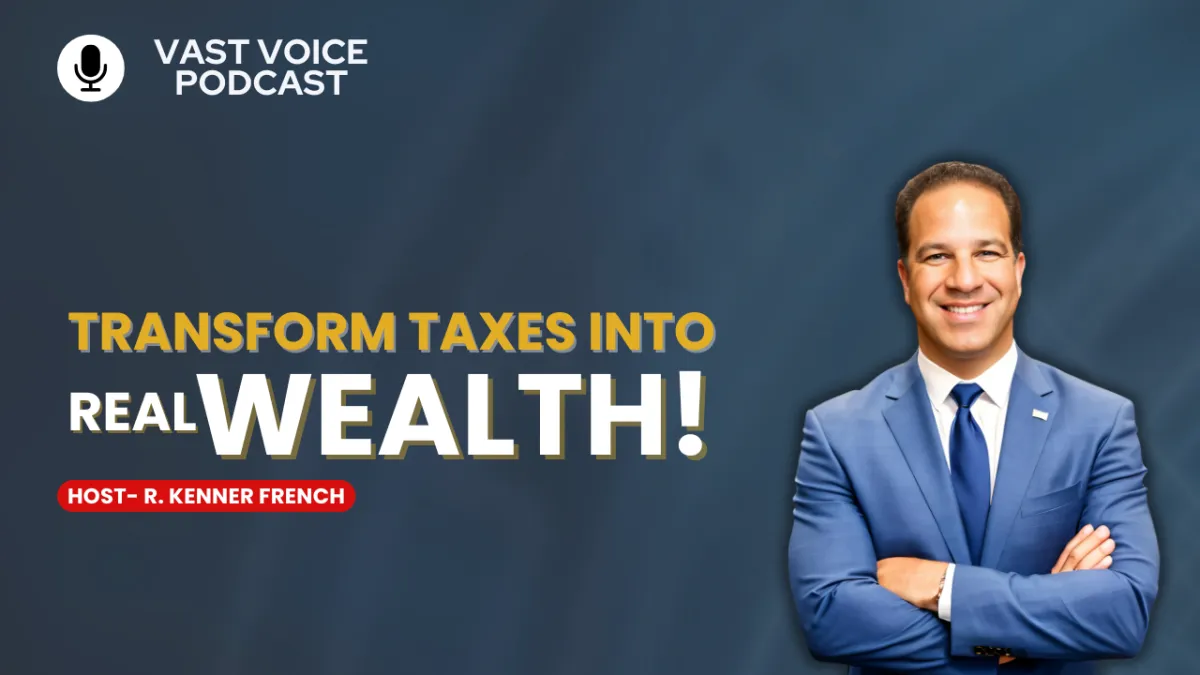
Transform Taxes Into Real Wealth!
R. Kenner French of VastSolutionsGroup.com begins by addressing brand-new real estate investors—especially W-2 employees—who are looking to break out of the corporate rat race. During a recent conversation with a couple in this exact situation, he explains why real estate is a powerful vehicle for increasing net worth and reducing tax liability. While traditional employees have limited tax-saving tools, such as contributing to a 401(k), owning a business entity that holds real estate opens the door to significantly more deductions and strategic opportunities.
Kenner emphasizes that U.S. tax law is generally friendly toward business owners and real estate investors. By forming an LLC or similar entity, new investors gain access to deductions for expenses like board meetings, computers, and operating costs—all of which support the business operations of a real estate entity. More importantly, real estate ownership unlocks major tax advantages, particularly through depreciation and bonus depreciation, which allow investors to accelerate deductions and reduce taxable income in the early years of ownership.
The couple Kenner spoke with was particularly interested in bonus depreciation, especially for commercial property. Kenner explains that through cost segregation and asset analysis, portions of a building can be depreciated much faster, creating substantial tax savings now rather than waiting decades. These accelerated deductions help offset income and significantly reduce personal tax burdens—something extremely appealing to W-2 earners trying to transition into real estate full-time.
Beyond real estate, Kenner highlights that the couple’s interest in artificial intelligence and workflow automation may qualify them for government-funded research and development (R&D) tax credits. These credits reward innovation and can dramatically lower tax liability. He also notes the couple’s potential path to achieving real estate professional status—requiring more than 750 qualifying hours—which offers even deeper tax benefits by allowing real estate losses to offset active income.
Finally, Kenner mentions that this couple plans to diversify internationally by investing in lower-cost global properties. Because they love to travel, acquiring real estate abroad at much lower prices allows them to build assets quickly and spread their investments across different markets. He closes by encouraging other W-2 employees considering real estate to explore similar strategies—diversification, entity structuring, tax planning, and innovation—so they can gradually shift away from traditional employment and build long-term wealth.
Takeaways
• Real estate can help increase net worth and lower taxes.
• W-2 employees have limited options for tax deductions.
• Setting up an entity for real estate can provide more deductions.
• Bonus depreciation allows for accelerated tax deductions.
• Investing in AI can enhance business efficiency.
• Research and development tax credits can lower tax liabilities.
• Global investing can provide opportunities for cheaper properties.
• Diversification in real estate can mitigate risks.
• Understanding tax strategies is crucial for new investors.
• Real estate investing can lead to financial freedom.
Sound Bites
• It's a big component of their strategy.
Listen & Subscribe for More:
🎧 The Vast Voice Podcast → Available on Spotify & Apple Podcasts
▶️ Subscribe on YouTube (@VastSolutionsGroup.com) for expert insights 🚀
📚 Don’t miss Modern Millions by R. Kenner French – the #1 BEST SELLING Amazon book (Entrepreneurship category) 👉 ModernMillions.ai
📚 Amazon Top Selling Author→ https://www.amazon.com/dp/B0FHBS32LG
Got Questions? Reach Us Anytime:
📞 415-212-8189
🕗 Monday–Thursday | 8:00 AM – 5:00 PM (Pacific)
🙏 Thank you for listening & supporting!
